11 Surprising Health Benefits of Mushrooms
Originally used in the East as both traditional medicine and food, many mushroom varieties have been studied intensively for their therapeutic properties over the past few decades. In fact, all edible mushrooms seem to possess both medicinal and nutritional qualities, although they must be prepared properly to release their full benefits.
Modern scientific evidence shows that medicinal mushrooms typically act to strengthen the immune system, lower the risk of cardiovascular disease, and help our bodies fight against free radicals, mutagens, and toxins.
These health benefits of mushrooms seem to exist mainly because of the presence of polysaccharides (complex sugar molecules) called beta glucans in their cell walls. Beta glucans are also present in cereal grains, mushrooms, algae, bacteria, fungi, and yeast. Early human clinical trials with beta glucans have confirmed that they have an immune-strengthening effect and are safe to consume, with minimal to no side effects for most people.
Along with boosting immunity, many of these potent mushrooms have other health benefits as a result of their actions on our bodies. Let’s take a closer look at what researchers have found…
Health Benefit of Mushrooms #1: Powerful Anti-Cancer Fighters
Brewed for thousands of years as a medicinal tea in China, turkey tail mushroom (known scientifically as Trametes versicolor or Coriolus versicolor) is used extensively in Asia to fight cancer.
One notable use is a turkey tail mushroom extract known as PSK (protein-bound Polysaccharide Krestin) that is widely used to 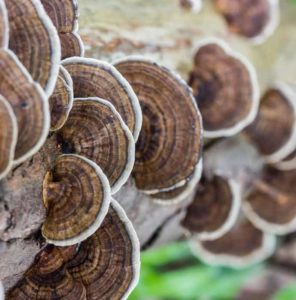 boost the immune system when treating many types of cancer in Japan.
boost the immune system when treating many types of cancer in Japan.
Multiple studies have confirmed that PSK prevents cancer cell growth with minimal adverse effects, while also simultaneously reducing side effects of standard anti-cancer therapy such as fatigue, loss of appetite, nausea, vomiting, and pain.
For instance, PSK has been shown to act powerfully against lung cancer and strengthen the immune systems of lung cancer patients, helping them to cope better with the consequences of toxic and invasive anti-cancer treatment.
Additionally, PSK has been shown to ease tumor-associated symptoms, and extend lifespan in patients undergoing radiation therapy and chemotherapy.
Along with all this, turkey tail mushroom extracts have also been found to:
– Slow breast cancer cell growth, reducing tumor weight by 36% and lowering metastasis to the lungs by 70.8% in a mouse model of metastatic breast cancer. [Note: metastasis is the spread of cancer cells from the original area where it began to other areas in the body, usually via the lymphatic system or bloodstream. In this mouse model, breast cancer cells metastasized to the lungs.]
– Slow the growth of human esophageal cancer cells by reducing their survival time and increasing their rate of apoptosis (also known as programmed cell suicide).
– Target cancer stem cells, preventing the formation of prostate tumors in a mouse model of prostate cancer – with an incredible efficiency of 100 percent and no side-effects whatsoever!
Red reishi is another popular medicinal mushroom. Known scientifically as Ganoderma lucidum, this potent “mushroom of immortality” is known as ling zhi in Chinese and reishi in Japanese.
Reishi may help patients to beat cancer in multiple ways. First, it stimulates the immune system, helping the body fight more effectively against cancer.
Second, a bioactive compound known as canthaxanthin (and possibly others) in reishi have been shown to help slow down tumor growth. Third, beta glucan – another bioactive compound – helps immune cells to bind more effectively to tumor cells and kill them more easily.
Because of these powerful anti-cancer abilities shown by reishi in both laboratory research and clinical usage, the Japanese government officially recognizes it as an anti-cancer therapy.
However, if you’re thinking of adding a reishi supplement or extract to your daily regimen you should first discuss the appropriate dose for your specific health condition with a qualified healthcare practitioner. Doses of commercial reishi products can vary widely and may not align with the research dosages studied.
Health Benefit of Mushrooms #2: Strengthening the Immune System
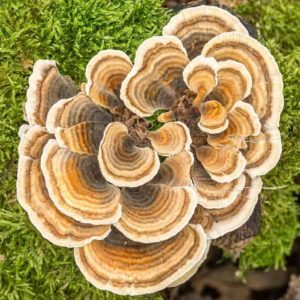 Along with helping to preventing abnormal cell growth, turkey tail mushroom extracts have been shown to help repair weakened immune systems in breast cancer patients after they had undergone standard chemotherapy and radiation therapy.
Along with helping to preventing abnormal cell growth, turkey tail mushroom extracts have been shown to help repair weakened immune systems in breast cancer patients after they had undergone standard chemotherapy and radiation therapy.
These mushroom extracts appear to do this by boosting the number and activity of natural killer (NK) cells and “cytotoxic T-cells,” which likely attack and kill off any remaining cancerous cells that are left after conventional anti-cancer therapies.
[Note: NK cells are specialized immune cells that recognize and bind to tumor cells and virus-infected cells and kill them. Similarly, cytotoxic T-cells are a type of white blood cell that kills cancer cells, cells that are infected (especially with viruses), or cells that are damaged in other ways.]
Scientific research also shows that bioactive polysaccharide compounds in reishi mushrooms boost the immune system by increasing the number of macrophages.
[Note: Macrophages are a type of white blood cell that digests cellular debris as well as foreign substances, bacteria, cancer cells, and anything else that cannot be identified as a healthy cell by our immune system.]
As already described above, a bioactive beta glucan compound in reishi helps immune cells bind more effectively to tumor cells and kill them more easily.
All of these immune-boosting actions of reishi have major implications for people suffering from bacterial and viral infections, as well as people with AIDS and other diseases that directly weaken their immune system. No wonder the patented turkey tail mushroom extract PSK (protein-bound Polysaccharide Krestin) has been widely used in Japan as a complementary immunotherapy for treating many different types of cancers since the early 1980s.
Health Benefit of Mushrooms #3: Protection Against Heart Disease and Stroke
Reishi appears in studies to offer a remarkable level of protection against heart disease and stroke, because it supports the body against many risk factors for these conditions. Health experts now believe that bioactive compounds in reishi known as ganoderic acids and others such as coumarin, mannitol, and polysaccharides act to:
– Lower triglyceride levels
– Remove excess cholesterol from blood
– Lower blood pressure (BP)
– Reduce platelet stickiness, preventing the formation of dangerous blood clots that can lead to heart attacks or strokes
– Help to correct arrhythmia (abnormal heart rhythms)
According to one study reported in the book “Alternative Medicine to Heart Disease” by Burton Goldberg in the late 90s, taking reishi extract three times a day for four weeks lowered blood pressure (BP) in 54 people with hypertension, who were otherwise unresponsive to medication.
Health Benefit of Mushrooms #4: Fighting Disease-Causing Free Radicals
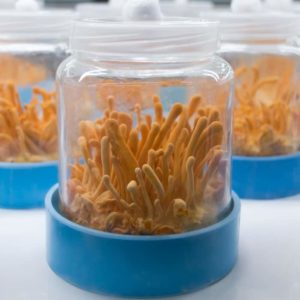 Oxidative stress and other forms of free radical-induced damage to cellular structures in our bodies are believed to increase the risk for heart disease, stroke, high blood pressure (BP), diabetes, cancer, Alzheimer’s disease, and other age-related conditions.
Oxidative stress and other forms of free radical-induced damage to cellular structures in our bodies are believed to increase the risk for heart disease, stroke, high blood pressure (BP), diabetes, cancer, Alzheimer’s disease, and other age-related conditions.
Free radicals are highly unstable chemical compounds which attack the nearest stable molecule and “steal” its electron. When the “attacked” molecule loses its electron in this way, it becomes a free radical itself, beginning a chain reaction.
If this process cascades, the growing numbers of free radicals can damage vital structures in your body such as the outer protective membrane of your body’s cells, cellular proteins, and even your DNA.
When you are exposed to excessive amounts of free radicals – for example, because of exposure to toxic chemicals, infections, and diseases – and your body’s detoxification systems are no longer able to cope, it can lead to the unhealthy situation known as “oxidative stress.”
Promisingly, a 2015 study published in the International Journal of Medicinal Mushrooms showed that consumption of reishi extracts for 2 weeks was able to restore some of the innate antioxidant enzyme activity in a rat with diabetes.
[Note: Antioxidants are molecules which neutralize harmful free radicals and protect vital cellular structures in our bodies from their damaging actions. While many antioxidants are obtained naturally from the foods we eat, our body also contains innate antioxidant enzyme systems.]
Similarly, in a laboratory mouse experiment reported in the journal Scientific Reports in 2015, a polysaccharide peptide isolated from reishi was seen to counteract oxidative stress caused by kidney damage, leading to lower levels of free radicals known as “reactive oxygen species” (ROS) and improved kidney function.
Some health researchers suspect that reishi may not have antioxidant compounds of its own, but rather it stimulates production of a free radical fighter that already exists in our own bodies; the innate antioxidant enzyme system known as superoxide dismutase (SOD).
Similarly, scientific evidence indicates that the amazing mushroom cordyceps – known scientifically as Cordyceps sinensis – also has potent antioxidant activity, which is believed to be partly responsible for its purported anti-aging, anti-cancer, anti-inflammatory, and immunomodulatory effects.
Health Benefit of Mushrooms #5: Managing Blood Sugar Levels
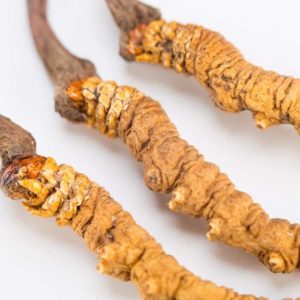 Cordyceps grows in the Himalayas and on the Tibetan plateau and has a very interesting, if slightly bizarre life cycle. Its spores land on the caterpillars of a particular moth species and enter its body. The caterpillar then buries itself into the soil before it dies. In summer, the fungus emerges like a plant from the caterpillar’s head, looking like a thin, orange finger.
Cordyceps grows in the Himalayas and on the Tibetan plateau and has a very interesting, if slightly bizarre life cycle. Its spores land on the caterpillars of a particular moth species and enter its body. The caterpillar then buries itself into the soil before it dies. In summer, the fungus emerges like a plant from the caterpillar’s head, looking like a thin, orange finger.
Multiple studies discussed in the textbook Herbal Medicine: Biomolecular and Clinical Aspects (2nd edition) demonstrate that cordyceps can lower blood glucose levels.
For instance, one study showed that consumption of a cordyceps extract known as CS-4 for 25 days increased insulin sensitivity, while reducing the insulin response to a carbohydrate challenge in normal, non-diabetic rats. These results indicate that CS-4 can potentially lower diabetes risk.
Similarly, in another study, normal rats given CS-4 for 17 days showed significant reductions in their fasting blood glucose and fasting plasma insulin levels.
While cordyceps did not affect fasting insulin levels in diabetic rats, they improved their weight, fasting blood glucose levels, and glucose tolerance (an indicator of diabetes risk) in these animals.
These and many other results from multiple studies indicate that cordyceps is likely to be useful in keeping blood sugar levels under control in patients suffering from diabetes.
Health Benefit of Mushrooms #6: Helping to Manage Stress Effectively
Reishi is an adaptogen – one of many plant forms that help to balance, restore, and protect the body. Specifically, adaptogens enhance the body’s overall ability to cope more effectively with stress and resist its unwelcome consequences, perhaps by actions on the body’s adrenal system, which is responsible for stress management.
Adaptogens exert a normalizing and tonic influence, neither over-stimulating nor interfering with normal body function, and help to counter the effects of chronic stress, anxiety, and insomnia on our bodies.
Many herbs, including Chinese or Korean ginseng, ashwagandha (Indian ginseng), astragalus, licorice root, holy basil, and mushrooms such as cordyceps and reishi are known adaptogens.
The philosophy of Eastern medicine states that our bodies need to defend themselves against threats to their “equilibrium.” Physical threats include viruses and bacteria, while mental or emotional threats (including stress) lead to anxiety and other unpleasant emotions that depress the immune system and overall functioning of the body.
Whatever the threat, reishi’s reputation is that it helps the body keep its innate balance and defend against threats to its equilibrium. Since diseases like heart disease and cancer are also clear signs that the body is out of balance, practitioners of traditional forms of Eastern medicine believe that an equilibrium-enhancing remedy such as reishi can help to treat these and many other ailments.
Health Benefit of Mushrooms #7: Enhancing Libido
Testosterone is necessary for normal sperm development. Cordyceps has traditionally been used for enhancing sexual function in many Eastern societies. Evidence from laboratory experiments on animals confirms that cordyceps can both improve reproductive activity and restore impaired reproductive function.
many Eastern societies. Evidence from laboratory experiments on animals confirms that cordyceps can both improve reproductive activity and restore impaired reproductive function.
Indeed, consumption of cordyceps has been shown to enhance libido and sexual activity, and restore impaired reproductive function in both men and women – likely by enhancing testosterone release in the body.
Health Benefit of Mushrooms #8: Improving Exercise Performance
Cordyceps made international headlines after Chinese runners broke two world records by huge margins at the Asian Games in 1993. According to their coach, the secret to their remarkable athletic performance was the so-called caterpillar fungus, Cordyceps sinensis.
A 2010 study reported in the “Journal of Alternative and Complementary Medicine” found that supplementation with the cordyceps extract CS-4 for 12 weeks improved exercise performance and contributed to overall markers of wellness in 20 healthy elderly adults.
One way cordyceps likely improves physical abilities and stamina is because it contains adenosine – a critical component of ATP – thereby stimulating production of ATP, one of the primary sources of energy in the cells of our bodies.
A 2007 study out of Hong Kong found that higher production of ATP by cordyceps helped athletes maintain intense workouts while also extending the length of time they were active at a high intensity.
A number of studies have also shown that supplementing with cordyceps can lower heart rate, which explains why people say they can train harder for longer periods when taking cordyceps supplements.
Health Benefit of Mushrooms #9, #10 & #11
Japanese researchers have found that certain bioactive compounds present in reishi act as natural antihistamines, providing strong anti-allergic benefits.
If you suffer from muscle aches or arthritis, some health experts claim that reishi is as powerful and as effective as hydrocortisone for relieving inflammation and pain, but with fewer side effects.
Finally, reishi mushrooms are traditionally believed to be able to calm the mind, along with improving memory, concentration, and focus.


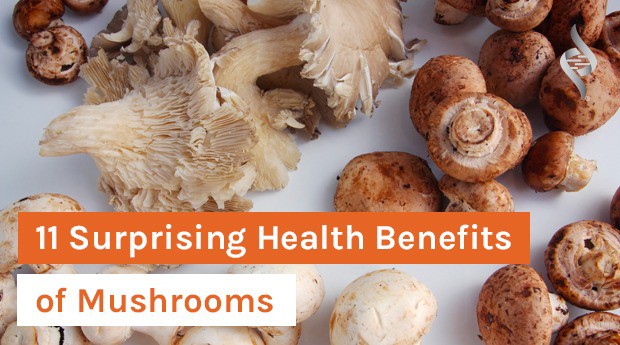
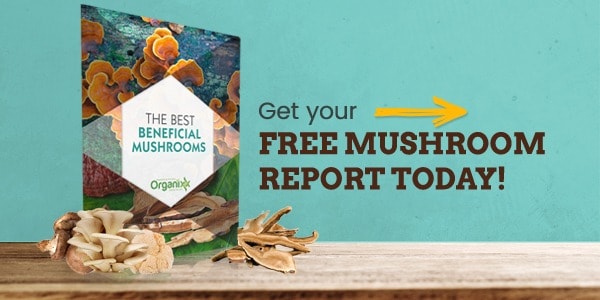
Comments